Large-Scale Organics Management
Composting on a larger scale than in our backyards provides our state with economic and environmental benefits. Connecticut is fortunate to be the home of several major compost producers that create jobs, contribute tax revenue, reduce our carbon footprint, and distribute products that naturally enhance our landscapes, prevent soil erosion, and help grow healthy crops. This web page is dedicated to providing resources to these and other smaller-scale facility operators, as well as generators of organic materials.
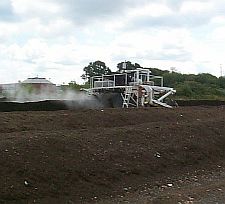
- Organics Laws and Regulations
- Leaf Composting
- Sheet Leaf Composting
- Grass Clipping Management
- On-Farm Composting
- Small-Scale Composting Facilities
- Composting and Wood Processing Facilities
- Anaerobic Digestion
- Food to Animal Feed Resources
- Permitting Resources
- Operator Training & Education Resources
NOTE: On and after January 1, 2022, each commercial food wholesaler or distributor, industrial food manufacturer or processor, supermarket, resort or conference center that is located not more than twenty miles from an authorized source-separated organic material composting facility and that generates an average projected volume of not less than twenty-six tons per year of source-separated organic materials shall: (A) Separate such source-separated organic materials from other solid waste; and (B) ensure that such source-separated organic materials are recycled at any authorized source-separated organic material composting facility that has available capacity and that will accept such source-separated organic material. --As required by CGS Section 22a-226e, "Recycling of Source Separated Organic Materials."
See also the following regarding the laws and regulations regarding the management of organics in Connecticut:
- Commercial Organics Recycling Law - Recycling of Source Separated Organic Materials (CGS Section 22a-226e). Definition of Source Separated Organic Material. See Letter to Food Business Managers.
- Mandatory Recycling Regulation (RCSA Section 22a-241b-1 through 22a-241b-2; includes leaves)
- Leaf Composting Regulation (RCSA Section 22a-208i(a)-1)
- Leaf Composting Permitting Exemption Enabling Legislation (CGS Section 22a-208i)
- Grass Clipping Disposal Ban (CGS Section 22a-208v)
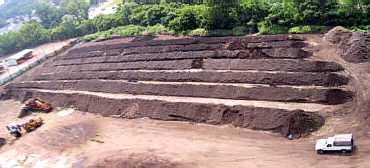 Recycling of leaves has been mandated in Connecticut since February 28, 1989. The DEEP and municipalities have made efforts to educate residents about home composting, but many towns and cities still collect leaves in massive quantities every fall. Fortunately, leaves can be turned into compost, a natural soil amendment with many beneficial properties that help plants thrive.
Recycling of leaves has been mandated in Connecticut since February 28, 1989. The DEEP and municipalities have made efforts to educate residents about home composting, but many towns and cities still collect leaves in massive quantities every fall. Fortunately, leaves can be turned into compost, a natural soil amendment with many beneficial properties that help plants thrive.
Anyone that practices leaf composting (other than at home, or from the property on which they were generated) must comply with the leaf composting regulation and register their facility with DEEP. Registration requires the submission of an information form, operation & management plan, and site plan. Certain siting, operation and reporting requirements apply. Potential applicants should become familiar with the regulation before deciding to prepare the documentation, and also inquire of your town what local zoning, wetland or other approvals are necessary. See the following for more information on leaf composting in Connecticut:
- Leaf Composting Regulation
- Leaf Composting Facility Registration Packet
- List of Registered Leaf Composting Facilities
- "Windrows of Opportunity" (Video, DEEP)
- "Compost - Send Your Leaves to a MULCH Better Place" A Guide for Municipalities, (CT DEEP)
- "Operator's Notes for a Short Course on Municipal Leaf Composting", (CT DEEP)
Sheet leaf composting (SLC) is the application and incorporation of leaves on cropland actively devoted to agricultural production as a soil amendment and mulch. Studies comparing the cost of conventional windrow composting to SLC conclude that SLC is a considerably less expensive option for recycling leaves. The availability of cropland in October and November during the bulk of the municipal leaf collection season makes sheet leaf composting a viable option for many municipalities and farmers. Municipalities have the opportunity to support local agriculture through public/private partnerships with farmers for the recycling of leaves.
Farmers are required to notify DEEP at least 30 days prior to accepting leaves for sheet composting using the notification form below. This usually means annually for most farmers, as they acquire leaves during the fall foliage season, and their fields are in production much of the year. They need to have a valid Connecticut Agricultural Sales Tax Exemption Permit, report to DEEP the volume of leaves accepted, and comply with basic leaf handling and application practices outlined in Section 22a-208i(a)-1(g) of the Leaf Composting Regulation.
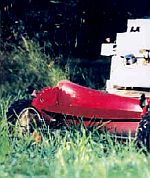 Grass clippings are banned from disposal in Connecticut. The best management practice for grass clippings is to leave them on the lawn so they can return valuable nutrients to the soil as they decay. Bagging and disposing of them costs both taxpayers and municipalities time and money. If grass clippings are removed, they must be recycled at a facility that is permitted by DEEP to accept them. Existing leaf composting facility operators must receive a General Permit registration approval before adding grass clippings to their compost sites. Grass clipping composting requires greater setbacks to neighbors and water sources, and stricter operating practices because of the potential for odor and water pollution.
Grass clippings are banned from disposal in Connecticut. The best management practice for grass clippings is to leave them on the lawn so they can return valuable nutrients to the soil as they decay. Bagging and disposing of them costs both taxpayers and municipalities time and money. If grass clippings are removed, they must be recycled at a facility that is permitted by DEEP to accept them. Existing leaf composting facility operators must receive a General Permit registration approval before adding grass clippings to their compost sites. Grass clipping composting requires greater setbacks to neighbors and water sources, and stricter operating practices because of the potential for odor and water pollution.
Grass clippings can also be recycled on farms following the guidance in the "Manual of Best Management Practices for Agriculture - Guidelines for Protecting Connecticut's Water Resources". This manual provides handling standards for direct cropland incorporation, incorporation into an agricultural composting operation, and incorporation into a farm waste storage facility.
- Grass Clipping Disposal Ban (Section 22a-208v of the CT General Statutes)
- Best Management Practices for Grass Clipping Management (PDF, 119K)
- General Permit for the Addition of Grass Clippings at Registered Leaf Composting Facilities
- Manual of Best Management Practices for Agriculture - Guidelines for Protecting Connecticut's Water Resources (See pages 245A - 245D specific to grass clippings).
Composting of farm-generated wastes on the farm do not need a solid waste facility permit, but may need to seek DEEP approval of a Comprehensive Nutrient Management Plan developed by a qualified professional. In this case, it must be demonstrated that composting is an integral part of the farming operation. Composting farm-generated wastes off-farm may require a solid waste permit, a water discharge permit, or a stormwater general permit, depending on size, location and feedstocks.
Please contact Joe Wettemann of the DEEP Water Permitting and Enforcement Division at 860-424-3803 with any agricultural waste management questions.
Small Scale Composting Facilities (under 5,000 cy/yr)
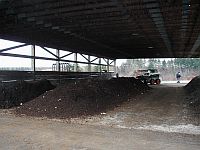 Operators of small-scale composting facilities (under 5,000 cy/yr) may need to register under the Stormwater General Permit for Discharges Associated with Industrial Activity. In addition to the basic conditions of this permit, Section 5(f)(10), pages 63-65, reference specific requirements for small scale composting facilities. Section 2 contains definitions for composting, industrial activity, small-scale composting and source separated organics materials. NOTE: This general permit does not regulate home composting or sites where composting is not the primary activity, business, or purpose of the facility.
Operators of small-scale composting facilities (under 5,000 cy/yr) may need to register under the Stormwater General Permit for Discharges Associated with Industrial Activity. In addition to the basic conditions of this permit, Section 5(f)(10), pages 63-65, reference specific requirements for small scale composting facilities. Section 2 contains definitions for composting, industrial activity, small-scale composting and source separated organics materials. NOTE: This general permit does not regulate home composting or sites where composting is not the primary activity, business, or purpose of the facility.
Registrants must submit a registration form and adhere to certain operation and reporting requirements. Facilities composting horse manure must submit a stormwater pollution prevention plan for review and approval. All other small composting facilities must develop a pollution prevention plan but are not required to submit their plan with the registration. However, the Commissioner has the authority to request a copy for review. Registrants are expected to use best management practices and comply with all local permitting requirements.
Please contact Joe Wettemann of the DEEP Water Permitting and Enforcement Division at 860-424-3803 with questions regarding this general permit.
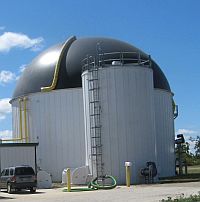 Anaerobic Digestion (AD) is a process where microorganisms break down organic materials, such as food scraps and manure, in the absence of oxygen. It uses either dry/high solids or wet/low solids technologies which produce biogas and a solid residual called digestate. The biogas is comprised primarily of methane and carbon dioxide, and can be used as a source of energy similar to natural gas. The digestate can be composted and used as a soil amendment. The benefits of anaerobic digestion include renewable energy generation, greenhouse gas emissions reduction, and waste diversion.
Anaerobic Digestion (AD) is a process where microorganisms break down organic materials, such as food scraps and manure, in the absence of oxygen. It uses either dry/high solids or wet/low solids technologies which produce biogas and a solid residual called digestate. The biogas is comprised primarily of methane and carbon dioxide, and can be used as a source of energy similar to natural gas. The digestate can be composted and used as a soil amendment. The benefits of anaerobic digestion include renewable energy generation, greenhouse gas emissions reduction, and waste diversion.
AD has been used in Europe and Canada for decades. With the advancements in technology, maturing recycling programs, energy incentive programs, and laws requiring organics (specifically food residuals) to be recycled, AD is now being seriously vetted as a solid waste management strategy in Connecticut and in the U.S. For permitting purposes, AD facilities that accept food residuals in CT are considered volume reduction plants (VRP's). It is recommended that companies thinking about locating AD facilities in CT request pre-application assistance from DEEP.
- Anaerobic Digestion in CT, Including Pilot Programs Energize CT
- Anaerobic Digestion - Basic Information and Environmental Benefits (EPA)
- How Biogas Systems Work (American Biogas Council)
- Proposed and/or Permitted Food AD Facilities in CT
- Anaerobic Digestion of Food Waste in New England (EPA, Sept. 2013)
- Small-Scale Organics-to-Energy Vendor Directory (MA Clean Energy Center)
- CT Farm Energy Program - Resource and clearinghouse of information to those interested in learning more about on-farm energy options.
- Collins Powder Hill Farm (Enfield, CT) Example of compost heat recovery system
- Freund Family Farm (East Canaan, CT) Only operating manure digester on a CT farm
- Barstow's Longview Farm (Hadley, MA) An example of on-farm manure AD with the addition of food residuals.
- Food Scrap Recycling: A Primer for Understanding Large-Scale Food Scrap Recycling Technologies for Urban Areas (U.S. EPA Region I, October 2012) This guide provides an overview of three technologies which could be used to recycle food residuals (or scraps)— aerobic windrow composting, in-vessel aerobic composting and anaerobic digestion—and highlights key considerations for municipalities interested in implementing large scale food scrap recycling in their communities. The guide was developed as part of a project supported by the U.S. Environmental Protection Agency (EPA) Office of Solid Waste and Emergency Response (OSWER) Innovation Program to provide technical assistance to the Cities of Providence, Rhode Island and Bridgeport, Connecticut in the evaluation of options for diversion of food scraps through composting and siting of composting facilities.
Food to Animal Feed Resources
Although some of these companies are headquartered in other states, some as far away as Texas, they are well versed in their industries and often operate nationwide. If there is enough of the type of feedstock they need in Connecticut, there may be opportunities for partnerships.
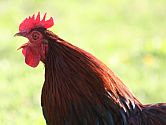
Animal Feed Companies:
- Baskin Livestock - Farm and animal feed milling plant that accepts bakery/snack food processing residuals; provides hauling and can de-package consumer food products.
- Full Circle Feed – Makes pet treats from food scraps.
- Melissa Feeders - Agricultural corporation providing animal feed from nutrients reclaimed from the food industry.
- Poulin Grain – Uses primarily virgin feedstock but open to accepting food manufacturing by-products if it meets their standard.
- ReConserve - Animal feed milling plant that accepts bakery/snack food processing residuals; provides hauling and can de-package consumer food products.
- Troiano Trucking, Inc. Hauler and transfer station that accepts bakery/snack food processing residuals for reuse by animal feed manufacturers.
Resource Management Companies (see also Resource Management Contracting):
- Casella Organics – A resource management company specializing in beneficial use/recycling of organics and interested in developing diversion to animal feed services.
- Organix Recycling – A resource management company specializing in organics that offers food to feed option.
- Quest Recycling – A resource management company that offers food to feed option.
Direct Feeding of Food Residuals to Animals:
Find a CT Piggery licensed by USDA to feed "garbage." Questions about providing food residuals to animal farmers should be directed to the CT Dept. of Agriculture Animal Health Division.
Composting and Wood Processing Facilities
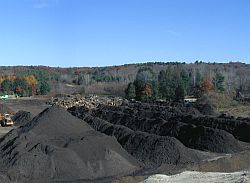 Sources of Compost in CT (CT DEEP)
Sources of Compost in CT (CT DEEP)- Registered Leaf Composting Facilities (CT DEEP)
- Permitted Food Residual Composting Facilities (CT DEEP)
- Permitted Clean Wood Processors (CT DEEP)
- Brush & Stump Management (CT DEEP)
- Solid Waste and Water Protection Composting Facility Permit Summary (CT DEEP) This summary is intended to guide staff and potential applicants as to the waste and/or water permits or approvals that may be required for specific types of composting facilities. The information provided is not to be relied upon as a complete description or interpretation of the provisions in any solid waste or water protection regulation. It is also not meant to cover every scenario that may arise. The DEEP strongly recommends that anyone who is currently operating or interested in establishing a composting facility become familiar with pertinent regulations and statutes, and contact the appropriate permitting division for technical assistance.
- DEEP's Environmental Permitting Process (CT DEEP)
- Solid Waste Permitting (CT DEEP)
- Pre-Application Assistance (CT DEEP)
- Current Permit Authorization Pathways for Food Waste Management (CT DEEP)
Operator Training and Education Resources
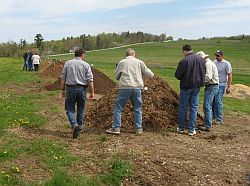
- Maine Compost School
- US Composting Council Certification Program
- Cornell Waste Management Institute Composting Resources
- CT Northeast Organic Farming Association
- Composting and Organics Recycling
Content Last Updated March 2021


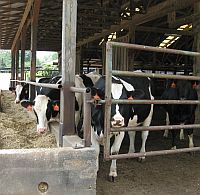 On-farm composting of
On-farm composting of